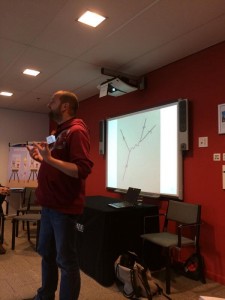QSEU14 Breakout Session: QS & Philosophy
Ernesto Ramirez
May 20, 2014
A core piece of our conferences are the numerous breakout sessions that cover a wide variety of topics from social sciences to hands-on workshops on privacy and data security. These sessions are facilitated by conference attendees and they put in a lot of work to engage their groups in meaningful discussion. This year, starting with our European Conference, we are going to extend the discussion outside of the conference. Below you can read a description of the breakout by the individual(s) who led the discussion. We invite you to follow up and continue the conversation in our forum, where we’ve carved out a special place for each separate discussion.
Today’s post comes to us from Joerg Blumtritt, who led the QS & Philosophy breakout session at the 2014 Quantified Self Europe Conference. You’re invited to read his take on the session and then join the discussion on the QS Forum.
 The session “QS and Philosophy” was originally intended as something like “Ideologies of QS”: I want to advocate for an open data culture without fear; however I felt the urge to discuss some topics that I felt left open in conversations I had experienced with trackers and gadgets-people, too often during the last months; explicitly my feeling that an idea of self-betterment could entail the fiction, that everyone really can take responsibility for their lives.
The session “QS and Philosophy” was originally intended as something like “Ideologies of QS”: I want to advocate for an open data culture without fear; however I felt the urge to discuss some topics that I felt left open in conversations I had experienced with trackers and gadgets-people, too often during the last months; explicitly my feeling that an idea of self-betterment could entail the fiction, that everyone really can take responsibility for their lives.
The #QSEU14 conference has brought these topics, that I had felt concerned with, even to the plenary programme, e.g. having Josh Berson’s emotional statement against this “liberal fallacy” as you might call it. So I learned that many of us were bothered by these questions, and an open conversation would take place all accross the conference. This gave room in my session to look into the future of QS on a broader perspective.
If QS would become a mass phenomenon (which none of us would have doubts about), will we feel a rise in moral expectations and control? Will our communities be looking after us, taking care, encouraging us, as well as discipline us? A participant in the session told the example of nanny-tracking on facebook, certainly a nasty form of abusing tracking for surveillance. Thus there is need to make a clear stand what is acceptable, and what we should expell from our community; and we have to consider how hierarchy and power (or the lack of it) will influence the effect of our practices. And we should consider in how far self-tracking flips into “other-tracking”. We discussed to some extension, if there is an option to just track yourself without touching others, at all; at least if you start sharing data within a community and built connections to others via your shared data.
The culture of tracking, sharing data, caring for others’ data, too, shows aspects of village life; we care for each other, but we also “get watched” that way. On the one hand, this might sound frightening. On the other hand, do we have the chance to change from “the state” or “the government” enforcing social rules in an authoritarian way, to get to an emergent system? Could we evolve the “QS philosophy” into an operating system that helps people on large scales to live together in a sustainable way?
One important aspect is algorithm ethics – implicit value judgements built into our technologies, often in the form of parameters that someone just set to a certain value without knowing or even considering the consequences. Value judgements are neither per se bad nor avoidable. However, it is our responsibility to demand access to the “black boxes”, to have transparency with technology that effects on our lives, and as makers of such technology to grant others access and have an open conversation with them.
Pre start, I had felt uncomfortable, even demanding (maybe pretentious) with my ethics debate. I was blown away about the turn that the conference as a whole made, in making the ethics debate a major topic from the very first talk to the farewell.
You can view slides from this breakout session here:
Interested in discussing the Philosophy of QS? Join the discussion on the forum!


